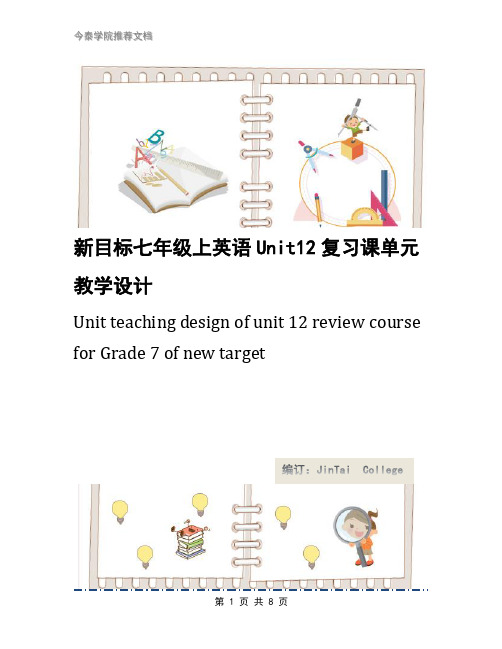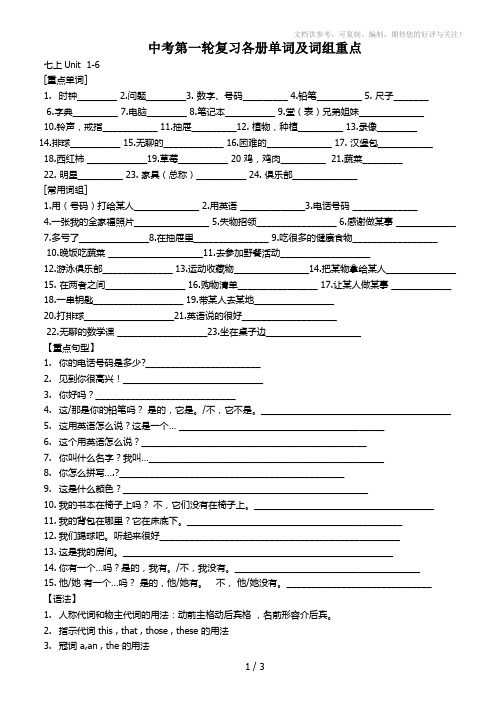七年级英语上新目标Unit1--12单元重点及语法总复习
新目标七年级上英语Unit12复习课单元教学设计

新目标七年级上英语Unit12复习课单元教学设计Unit teaching design of unit 12 review course for Grade 7 of new target新目标七年级上英语Unit12复习课单元教学设计前言:小泰温馨提醒,英语作为在许多国际组织或者会议上都是必需语言,几乎所有学校选择英语作为其主要或唯一的外语必修课。
英语教学涉及多种专业理论知识,包括语言学、第二语言习得、词汇学、句法学、文体学、语料库理论、认知心理学等内容。
本教案根据英语课程标准的要求和针对教学对象是初中生群体的特点,将教学诸要素有序安排,确定合适的教学方案的设想和计划、并以启迪发展学生智力为根本目的。
便于学习和使用,本文下载后内容可随意修改调整及打印。
新目标英语七年级unit 12复习课单元教学设计设计者姓名:薛玉鹏联系方式:关口初中一、教学内容:unit 12 my favorite subject is science. (revision)二、教材及学情分析:本单元主要学习一周中星期一到星期天的表达方式;掌握学科的表达;学习用because和表示品质的形容词表示理由;学习what,why,who引导的特殊疑问句。
本单元围绕“谈论自己所喜欢的学科”这一话题,设计了三个任务型活动:任务一是:谈论自己所喜欢的学科,学习what引导的特殊疑问句和学科的表达;任务二是:通过free talk,让学生谈论自己喜欢某一学科的理由,学习why等特殊疑问句;任务三是:作报告、写对话、写作训练,巩固和延伸所学知识,掌握星期的表达方式。
what’s your/his/her favorite subject? my/his/her favorite subject is english.why do you like math.because it’s interesting.why does he/she like art? because it’sfun.when do you have math? i have math 0n monday,wednesday and friday.what’s ken’s favorite subject? science.单元总体目标通过本单元的复习使学生学会谈论自己喜好的学科或自己喜好的其它事情并给出理由;学会说出一周的七天;学会合理地安排自己的作息时间。
七年级英语新目标上1 4单元短语,句型,语法

七年级英语新目标上1 4单元短语,句型,语法七年级英语新目标上1-4单元短语,句型,语法七年级上学期期中复习(背诵)一trained篇;重点句型1goodmorning/afternoon/evening.goodmorning/afternoon/evening.早上/下午/晚上好!2howareyou?你好吗?i’mfine,/ok,thanks.fine,thanks.很好,谢谢你.3what’sthisinenglish?这个用英语怎么说?it’samap.它就是一张地图.it’sv.它就是字母v.spellitplease.请拼一下。
k-e-y.4whatcolorisit/thekey?它什么颜色?it’sblue.它是蓝色thekeyisyellow.钥匙是黄色,5hello,frank.你好!弗兰克。
hello/hi,eric.你好,埃瑞克unit1mynameisgina.重点句型1what’syourname?你叫做什么名?mynameisjenny.我叫做詹妮。
=i’mjenny./jenny.2nicetomeetyou.见到你很高兴。
nicetomeetyou,too.3what’shisname?他叫做什么名?hisnameisjenny.他叫做詹妮。
he’sjenny.4what’shername?hernameislinda.她的名字叫琳达。
she’slinda.5what’syourfirstname?你的名是什么?myfirstnameisjack.我的名字就是杰克。
=jack.6what’syourlast/familyname?你的姓什么?mylast/familynameisgreen.=it’sgreen.我的姓氏就是格林。
7what’syour/his/herphonenumber?你的电话号码就是什么?my/his/herphonenumberis234-4567./it’s281-9176.我的电话吗是。
人教版新目标初一上册英语unit12知识点

人教版新目标初一上册英语unit12知识点人教版新目标初一(七年级)上册英语unit12知识点,是由中考网小编特整理的,主要包括句型、主格、句式、词汇及相关的练习,适合新初一同学们学习,也适合教师教学使用,供大家参考!Unit 12 My favorite subject is science.词汇1.中学阶段常见科目Chinese语文 P.E.体育art美术 science科学 music音乐 math数学history历史 biology生物 physics物理 chemistry化学2.“favorite+名词”表示“最喜欢的……”favorite city最喜欢的城市favorite food最喜欢的食物favorite color最喜欢的颜色favorite TV show最喜欢的电视秀favorite sport 最喜欢的运动favorite subject最喜欢的科目3.on Monday在星期一4.“have+学科名词”表示“上……课” have math上数学课have science上科学课5.my music teacher我的音乐老师6.my last class我的最后一节课7.be tired是疲劳的(相当于feel tired) 8.after lunch午饭后 after class下课后9.play + 球类名词10. play with sth.和某物玩耍play with my dog和我的狗一起玩耍句式1.询问某人最喜欢的物品的句型—What’s your favorite subject?—My favorite subject is science2.询问原因的句型及答语—Why do you like P.E.?—Because it’s fun.3.询问某人的句型及答语—Who is your science teacher?—My science teacher is Mr Wang.4.主系表结构——sb.+be动词+形容词I’m really busy!5. 主系表结构——sth.+be动词+形容词It’s difficult,but interesting.Music is relaxing.6.and连接的并列句Our teacher is very strict and I’m usually very tired after.句型:What’s your favorite subject?My favorite subject is math.What’s his favorite subject?His favorite subject is art.What’s her favorite subject?Her favorite subject is P.E.What subject do you like best? I like math best.Why do you like math? Because it’s interesting.Why does he like art? Because it’s fun.Who is your art teacher? Our art teacher is Mrs. Jones.I’m really busy doing my homework.She is busy with her work.I have science. It’s too difficult.I’m really tired of watching TVI like to play with my dog.He is always running around with me.结构:1, favorite=like…best 最喜爱……2, be busy doing sth 忙于做某事 be busy with sth 忙于某事3, be tired of doing sth 做……感到厌烦练习题1.She ________(play)_______(a\an\the\\) chess every day.2.I _________(speak\talk\tell\ask)English and watch TV with them.3.Can you _________(play)________(the\a\an\\)guitar? Yes,___________4.Can she ______(play)______(the\a\an\\)soccer with _________(he)?5.Can she play soccer ________? Yes.She is a ________soccer player. A.well B.good C.nice D.fine6. She is good ___kids.She is good _____teaching.Staying with kids ______(be) good _______her ______(health).A.withB.atC.forD.to7. Can you help him _________English ? A. with B.at C.forShe ________(play)_______(a\an\the\\) chess every day.8.I _________(speak\talk\tell\ask)English and watch TV with them.9.Can you _________(play)________(the\a\an\\)guitar? Yes,___________10. Can she __________(play)________(the\a\an\\)soccer with _________(he)?11.Can she play soccer ________? Yes.She is a ________soccer player. A.well B.good C.nice D.fine12.She is good ______kids.She is good _______teaching.Staying with kids ______(13. Can she help him __________(do)___________(one’s) homework.?14. Can we help them with __________(swim)?15. Can you sing ________dance? A.or B.and C.as16. I can __________ Chinese kung fu. A.do B make C.play17. She is a famous _____(music).She ______(listen)to ____(the\a\an\\) music.There ____(be) pieces of music on the radio.18. She gets up ________7 c’clock.19. It’s time _______(for\to\with) him_________(take) a shower.20.I had a hard time __________(study) English.21.He gets up at__________(abou\around\only)5 o’clock,and t________he has breakfast.22. Li Lei,please __________(give)my__________(good)_______(wish) to both of your ______(parent).23. He is _________(interest) in science.He like the subject.Because it’s_________(interest).24. After_______(a\an\\)class we usually play volleyball __________(for\at\in\on)two hours.25. I _________(not) like ________(any\some\few)subject.I like_________(play)with my dog.26.My dog’s job is __________(run) around with me.27. I often play ________basketball with my classmates.The baby likes playing_________the basketball.A.withB.\C.andD. the28.I have no time to watch TV.I am busy_________(with\in\on)my English.My father is busy __________(cook) for me.29.Lucy and Lily are twins._____________bags are big._______________parents are both busy.A.Lucy and Lily’sB. Lucy’s and Lily’sC. Lucy’s and LilyD.Lucy and Lily30. ------Do you know __________?------Yes.She had his twelfth birthday yesterday.A. how old she isB.when did he have his birthdayC.how many birthdays she had。
人教新目标七年级英语上册Starter unit1单词+重点句型+语法解析

人教版新目标七年级上 Starter unit 1 Good morning1.good adj.好;好的【解析】联想:look v. 看;book n. 书 be good at 擅长be good for 对……有益;be good to 对……友好反义词:bad2.morning n. 上午【解析】 in the morning 在早上表示在具体的某一天的早上,下午,晚上时用介词on:on the morning of April 3rd 4月3日的早晨Good morning 早上好3.afternoon n. 下午【解析】 after (prep.在…之后)+noon (n.中午)=afternoonGood afternoon 下午好in the afternoon 在下午at noon 在中午4.evening n. 晚上;傍晚【解析】Good evening 晚上好in the evening 在晚上Good night 晚安at night 在深夜5、are v. 是【解析】are 用于人称代词 we,you,they,或复数名词之后,第一人称单数I 与am搭配,第三人称单数与is 搭配。
6.you 可以是第二称单数,也可以是第二人称复数。
7. I【解析】第一人称主格代词,无论在句子中的什么位置I 始终用大写形式,在一般现在时中,其后的be 动词只用am.1、Good morning/Good afternoon/Good evening 上午好/中午好/下午好【解析】① Good morning 一般用于凌晨至中午12点之前,good afternoon 用于中午12点到下午6点之间,good evening 用于黄昏到入睡前。
②见面问候语,常用于比较正式的场合。
在非正式场合和日常口语中,熟人或朋友间常用Moring!/Afternoon! /Evening!进行问候。
注:Good night 并不是问候语,而是晚上分别获就寝前的道别用语,意为“晚安”,“再见”noon 中午 night 夜晚 midday 正午 midnight 子夜yesterday 昨天 today 今天 tomorrow 明天day 日 week 周 month 月 season 季 year 年 century世纪2、How are you?你好吗?【解析】是熟人或朋友见面时询问对方的身体状况的寒暄语。
七上unit1-12中考第一轮复习各册单词及词组重点

中考第一轮复习各册单词及词组重点七上Unit 1-6[重点单词]1.时钟________2.问题________3. 数字、号码_________4.铅笔_________5. 尺子_______6.字典_________7.电脑________8.笔记本__________9.堂(表)兄弟姐妹_____________10.铃声,戒指___________ 11.抽屉_________12. 植物,种植_________ 13.录像________14.排球__________ 15.无聊的____________ 16.困难的_____________ 17. 汉堡包___________ 18.西红柿 ____________19.草莓__________ 20 鸡,鸡肉_________ 21.蔬菜________22. 明星_________ 23. 家具(总称)__________ 24. 俱乐部_____________[常用词组]1.用(号码)打给某人_____________2.用英语 _____________3.电话号码 _____________4.一张我的全家福照片_______________5.失物招领________________6.感谢做某事 ____________7.多亏了______________8.在抽屉里_______________9.吃很多的健康食物_________________10.晚饭吃蔬菜 ___________________11.去参加野餐活动__________________12.游泳俱乐部______________ 13.运动收藏物_______________14.把某物拿给某人______________ 15. 在两者之间________________ 16.购物清单________________ 17.让某人做某事 ____________ 18.一串钥匙__________________ 19.带某人去某地________________20.打排球__________________21.英语说的很好___________________22.无聊的数学课 __________________23.坐在桌子边___________________【重点句型】1.你的电话号码是多少?_______________________2.见到你很高兴!____________________________3.你好吗?____________________________4.这/那是你的铅笔吗?是的,它是。
冀教版七年级英语上册各单元核心知识点和语法回顾

冀教版七年级英语上册各单元核心知识点和语法回顾Unit 1: Greetings- Greetings: Hello, Hi, Good morning, Good afternoon, Good evening, Good night, How are you?- Farewells: Goodbye, Bye, See you, See you later- Questions: What's your name?, How old are you?, Where are you from?, What's your phone number?, How's the weather?Unit 2: School Life- Classroom objects: desk, chair, blackboard, book, pen, pencil- Subjects: Chinese, English, Math, Science, Music, Art, PEUnit 3: Hobbies- Hobbies: reading, playing soccer, listening to music, dancing, swimming, drawing- Expressing preferences: I like..., I love..., I enjoy...Unit 4: Family and Friends- Family members: father, mother, brother, sister, grandfather, grandmother- Describing family: My father is tall, My mother is kind, I have a younger sister- Asking about family: Who's this?, How many people are there in your family?Unit 5: Daily Routine- Daily activities: get up, have breakfast, go to school, have lunch, do homework, have dinner, go to bed- Time expressions: in the morning, in the afternoon, in the evening, at nightUnit 6: Food and Drink- Food items: apple, banana, orange, bread, milk, water, rice- Expressing likes and dislikes: I like ..., I don't like ...Unit 7: My City- Places in the city: park, library, museum, supermarket, zoo, cinema- Asking about locations: Where is the park?, How can I get to the museum?Unit 8: Festivals- Festivals: Chinese New Year, Mid-Autumn Festival, Christmas- Celebrating festivals: give red packets, eat mooncakes, exchange giftsUnit 9: Travel- Means of transport: bus, car, train, plane, bike- Asking about travel plans: Where are you going?, How are you going there?Unit 10: Health- Health problems: headache, fever, cough, stomachache, toothache - Giving advice: You should rest, You should see a doctor以上是冀教版七年级英语上册各单元的核心知识点和语法回顾。
七年级英语上册知识梳理1新版新目标.doc
七年级英语上册知识梳理1(新版新目标)本资料为WORD文档,请点击下载地址下载全文下载地址莲山课件k七年级上册知识梳理(1)一、be动词用法小结1、be动词有三种形式:,和2、用法口诀:我(I)用,你(you )用,跟着他(he)、她(she)、它(it),单数,复数 O3、练习(用am、is、are填空):(1) -- ------- youGinaB rown?---- N o, I Gi naSmith.(2)Lily a nicegirl.(3 ) yourbrother agoods tudent.(4)T om' sparents inBei j ing.(5)mype ncil in myschoolbag.二、冠词1、冠词分为不定冠词和定冠词,不定冠词是和,定冠词是 O2、不定冠词a、an通常位于单数可数名词前,表示;其中an用于音素之前°定冠词the位于名词前,含义为,表示特指。
3、练习(用a、an填空):(1)That is Engli shbook.(2)o urschoolhas artfes tivalonSatur day.(3)Ihav e eggand hamburgerf or lunch .(4) --- Is this sch oolIDcard?---- No, it' s IDcard .(5)mydogha s inte restingname.三、人称代词1、人称代词有两种形式,和 O2、主格做,宾格做 o主语是动作的发出者,宾语是动作的承受者。
3、表格记忆人称第一人称第二人称第三人称单数复数单数复数单数复数主格 Iweyou youhesheitth ey宾格 meusyou youhimheritt hem词义我我们你你们他她它他(她、它)们四、物主代词1、物主代词分为和2、形容词性物主代词相当于一个,放在名词前,表示"” ;名词性物主代词相当于一个—,表示“",等于3、表格记忆人称第一人称第二人称第三人称单数复数单数复数单数复数形代 myouryo uryourhisher itstheir名代 m ineoursyours yourshishers itstheirs词义我的我们的你的你们的他的她的它的他(她、它) 们的4、练习(用括号内单词的正确形式填空):(1)Let(I) playcomputer games, mom!(2 )( he ) is jack.( he ) tele phonenumberis835-8644.(3)(my) a maboyand(her) isag irl.(4)This is(I)(yo u) ?(5) ---- Arethese(you) book s?---- No, they' renot(my). They' re(her).五、指示代词1、指示代词只有四个,它们分别是和,和 o2、this译为,指代较近的一个人或物;that 译为,指代较远的一个人或物。
初中英语人教新目标七年级上册(2023年更新)Grammar语法专项复习
七年级二班英语网上教学教案教学目标:掌握数词的用法。
能读简单的对话。
教学内容:(1)语法专项复习(三)一数词表示数量多少或先后顺序的词称为数词。
英语中数词可分为基数词和序数词。
基数词表示数目的多少,序数词表示顺序,意思是“第几二它们的具体用法如下:A.基数词的用法(复习)1.基数词在句中的作用基数词的作用相当于名词和形容词,在句中可作定语、主语、宾语(介宾)、表语、同位语等。
例如:Eight is my lucky number.My lucky number is eight.2. hundred, thousand, million, dozen, score这些词前面如有具体数字时,用单数形式,不能加\”;但表示不确切的数目时,用复数形式,并要与of短语连用。
例如:three hundred people; five thousand years; thousands of people;hundreds of students; thousands of trees3.在表示编号、年代、时刻、币制、小数、计量等时常用基数词。
例如: 第三课:Lesson Three 第二十五页:Page 25 第423 房间:Room 423 in sixties/eighties/nineties 在60/80/90 年代in one's twenties/thirties/forties 在某人20多岁/30多岁/40多岁.基数词变化规律口诀:1至12逐个记,13至19 teen结尾;20至90整十数,ty结尾是后缀;要是表示几十几,连字符十位连个位;若要表示几百几,hundred之后and立。
8.序数词的用法(复习)1.序数词表顺序,主要作定语,其前面须加上定冠词the,此外,也作主语、宾语、表语和定语等,这时,被它所修饰的名词往往被省略。
例如:The first ( person ) to arrive is Mike.2.序数词与名词连用时要在序数词前加定冠词the (序数词前有my, his, her 等修饰时除外)。
英语七年级上册Unit1单元语法清课件 人教新目标版
单元语法清语法精讲一、一般现在时中be动词的用法1.be动词的形式在一般现在时的句子中,be动词有三种形式:am,is,are。
2.be动词的用法(1)am用于主语为第一人称单数代词I的情况。
(2)is用于主语为第三人称单数代词、可数名词单数或不可数名词的情况。
(3)are用于主语为第一、三人称代词复数、第二人称代词或可数名词复数的情况。
3.be动词的缩写I am=I'mꢀyou are=you'reꢀhe is=he'sshe is=she'sꢀwhat is=what'sꢀis not=isn'tit is=it'sꢀare not=aren'tꢀthey are=they're【注意】be动词在以下几种情况下不能缩写:(1)在肯定简略回答中,如“Yes,I am.”或“Yes,he/she/it is.”。
(2)this和is不缩写。
(3)am和not不缩写。
4.be动词在一般现在时中的各种句式肯定句:主语+am/is/are+其他.否定式:主语+am/is/are+not+其他.一般疑问句:Am/Is/Are+主语+其他?肯定回答:Yes,主语+am/is/are.否定回答:No,主语+am/is/are+not.二、形容词性物主代词物主代词是表示所有关系的代词,是人称代词的属格形式。
它分为第一人称、第二人称和第三人称,每个人称又分为单数和复数。
物主代词分为形容词性物主代词和名词性物主代词,本单元主要涉及形容词性物主代词。
1.形容词性物主代词的形式ꢀꢀꢀ数人称单数我的my你的your复数我们的our 你们的your第一人称第二人称第三人称他的his 她的her 它的its他/她/它们的their2.形容词性物主代词的用法(1)形容词性物主代词必须置于名词前,修饰限定名词,作定语。
eg:my key我的钥匙ꢀhis name他的名字(2)形容词性物主代词与形容词一起修饰名词时,形容词性物主代词要放在形容词的前面。
- 1、下载文档前请自行甄别文档内容的完整性,平台不提供额外的编辑、内容补充、找答案等附加服务。
- 2、"仅部分预览"的文档,不可在线预览部分如存在完整性等问题,可反馈申请退款(可完整预览的文档不适用该条件!)。
- 3、如文档侵犯您的权益,请联系客服反馈,我们会尽快为您处理(人工客服工作时间:9:00-18:30)。
1 初中七年级上语法总复习 一. Be 动词(am, is, are)的用法 口诀:I 用am , you 用are ,is 连着他(he)她(she)它(it)。单数统统用is,复数一律都用are. 变疑问,往前提,句末问好莫丢弃,变否定,更容易,be 后not莫忘记,疑问否定任你变,句首大写莫迟疑。 注意:be 动词通常会和其他词连写在一起,如:I’m , what’s ,name’s, they’re等。I ________ a student. You ________ Janpanese. He _______ my brother. She_______ very nice. My name ________Harry. I _______ 10 years old. Lilei _________ very tall. Mary, this _________ Tom. Miss Zhou ________ my teacher. What_____ this? The cat________ black. This book________ very interesting. Lilei and I __________ good friends. These ________ apples. Those_________ bananas. They _________students. ________ she from China? ________ you good at English? The books ________ on the desk.
I ______ a boy. ______ you a boy? No, I _____ not. The girl______ Jack's sister. The dog _______ tall and fat. The man with big eyes _______ a teacher. ______ your brother in the classroom? Where _____ your mother? She ______ at home. How _______ your father. Mike and Liu Tao ______ at school. Whose dress ______ this? Whose socks ______ they? That ______ my red skirt. Who ______ I? The jeans ______ on the desk. Here ______many oranges for you. Here ______ some sweaters for you. The black pants ______ for Su Yang. This pair of boots ______ for Yang Ling. There some milk for me. Some tea ______ in the glass. Gao shan's shirt _______ over there. My sister's name ______Nancy. This ______ not Wang Fang's pencil. ______ David and Helen from England? There ______ a girl in the room. There ______ some apples on the tree. _______ there any kites in the classroom? _______ there any apple juice in the bottle? There _______ some bread on the plate. There _______ a boy, two girls, three men and ten women in the park. You, he and I ______ from China. My telephone number________8563-0770.
二.人称代词与物主代词 人称 第一人称 单 数 第二人称 单 数 第三人称单数 第一人称 复 数 第二人称 复 数 第三人称 复 数 主格 I you he she it we you they
我 你 他 她 它 我们 你们 他(她、它)们 宾格 me you him her it our you them
我 你 他 她 它 我们 你们 他(她、它)们 形容词性物主代 词
my your his her its ours your their
我的 你的 他的 她的 它的 我们的 你们的 他(她、它)们的 1. 通常情况下,人称代词的主格在句子中作主语。 2. 通常情况下,称代词的宾格在句子中作宾语或介词宾语。 2
3. 形容词性的物主代词属于限定词,后面要跟它所限定的名词。 4. 通常情况下,人称代词主格会与跟在它后面的be动词缩写。如:I am=I’m you are=you’re He is=he’s she is=she’s it is =it’s we are=we’re they are=they’re 一 根据句子前后内容,写出正确的代词。 Li lei is from China.___________ is Chinese. My name is Gina._________ am a student. This is Tom.________ is in Grade Two. His name is Tony.___________ telephone number is 856-0770. She is a student.________name is Julia. 二.用所给词的适当形式填空 1. That is not _________ kite. That kite is very small, but _________ is very big. ( I ) 2. The dress is _________. Give it to _________. ( she ) 3. Is this _________ watch? (you) No, it’s not _________ . ( I ) 4. _________ is my brother. _________ name is Jack. Look! Those stamps are _________. ( he ) 5. _________ dresses are red. (we) What colour are _________? ( you ) 6. Here are many dolls, which one is _________ ? ( she ) 7. I can find my toy, but where’s _________? ( you ) 8. Show _________ your kite, OK? (they) 9. I have a beautiful cat. _________name is Mimi. These cakes are _________. ( it ) 10. Are these _________ tickets? No, _________ are not _________. _________ aren’t here. ( they ) 11. Shall _________ have a look at that classroom? That is _________ classroom. ( we ) 12. _________ is my aunt. Do you know _________ job? _________ a nurse. ( she ) 13. That is not _________ camera. _________is at home. ( he ) 14. Where are _________? I can’t find _________. Let’s call _________ parents. ( they ) 15. Don’t touch _________. _________ not a cat, _________ a tiger! 16. _________ sister is ill. Please go and get _________. ( she ) 17. _________ don’t know her name. Would you please tell _________. ( we ) 18. So many dogs. Let’s count _________. ( they ) 19. I have a lovely brother. _________ is only 3. I like _________ very much. ( he ) 20. May I sit beside _________? ( you ) 21. Look at that desk. Those book are on _________. ( it ) 22.The girl behind _________ is our friend. (she ) 三. 指示代词this ,that, these, those. These 是this 的复数形式,指时间、距离较近的或下面要提到的人或事。Those 是that的复数形式,指时间、距离较远或者前面已经提到的人或事。如: This is my room. That is Lucy’s room. These are his brothers. Those are he books. 四.冠词的用法 冠词分为不定冠词(a ,an)、定冠词(the)和零冠词(不用冠词的情况)三种。 不定冠词a(an)与数词 one 同源,是“一个”的意思。a 用于辅音音素前,而 an 则用于元音音素前。 不定冠词a、an的用法: 1. 用于可数名词的单数形式前,表示"一" There is a tiger in the zoo.动物园里有一只老虎。 2. 表示一类人和东西 A tiger can be dangerous.老虎可能有危害性。 3. 表示"某一个"的意思 A gentleman wants to see you.有一位先生要见你。
